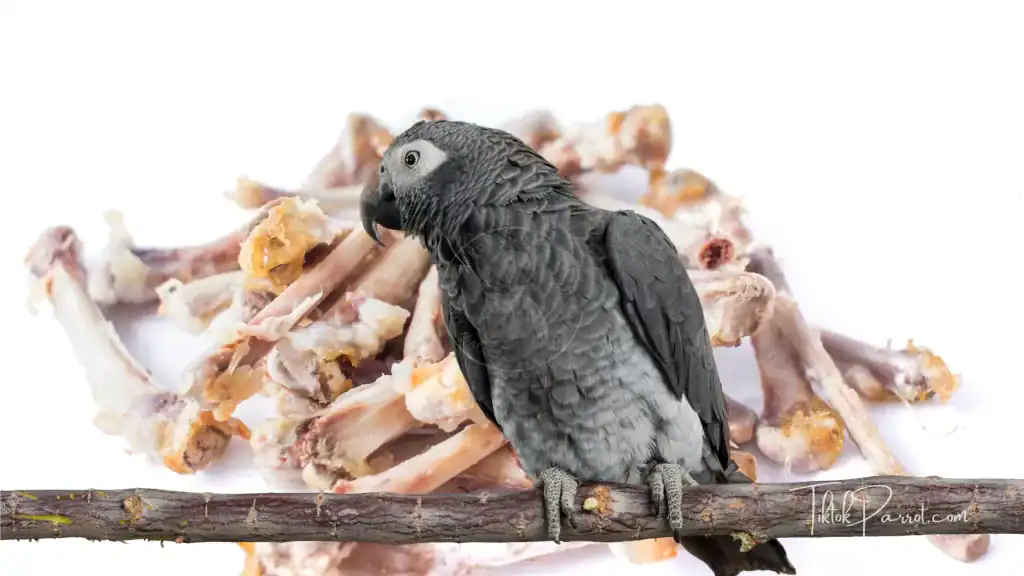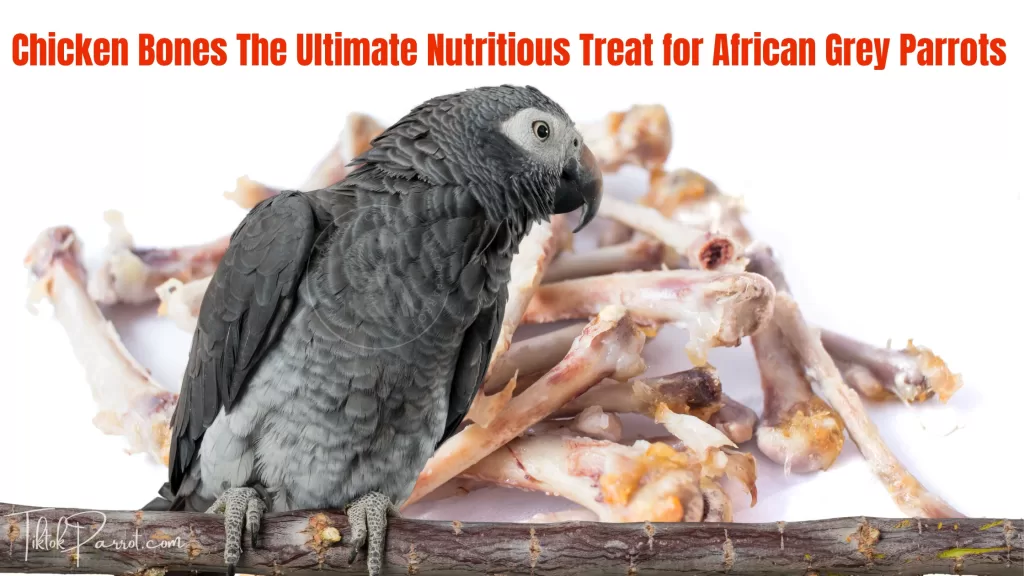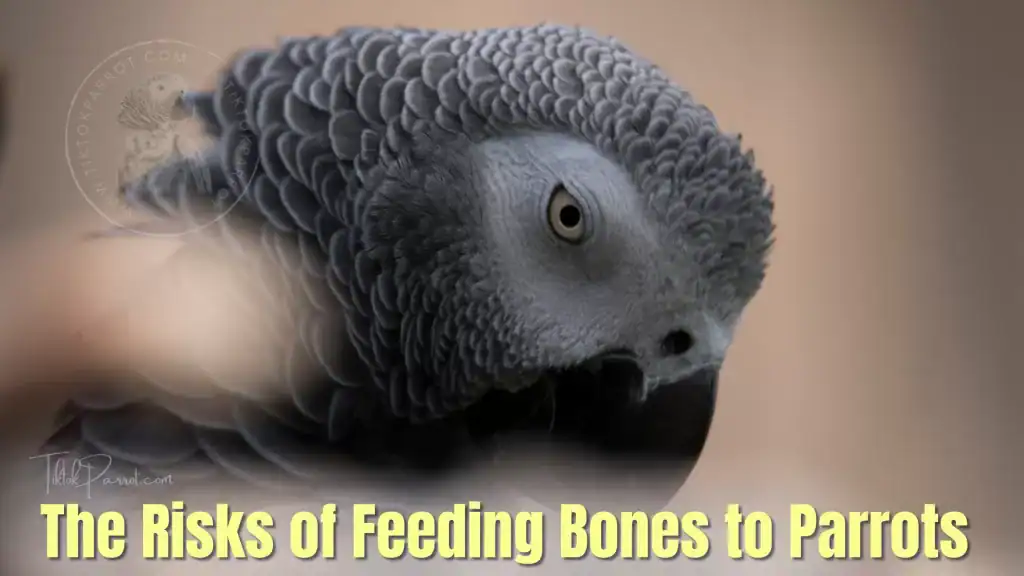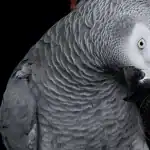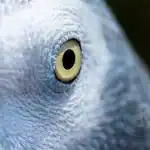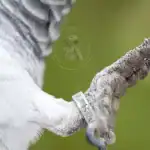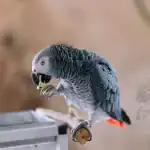We understand the importance of providing your African grey parrot with the best possible treats. We believe that one of the best treats for these beautiful birds is chicken bones.
In this article, we will delve into the reasons why chicken bones are such a great choice for your African Grey Parrot, and why you should consider incorporating them into your pet’s diet.
Discover the benefits of using chicken bones as a nutritious treat for your grey parrot. Our comprehensive guide provides everything you need to know to safely and effectively incorporate this natural source of calcium into your pet’s diet. You can provide the opportunity to give your pet a taste of the wild and promote mental stimulation, but there are some disadvantages as well – read on now!
Chicken bones are a great source of calcium, which is an essential nutrient for parrots. In the wild, parrots obtain calcium from chewing on branches, nuts, and seeds.
However, in captivity, it is important to supplement their diet with additional sources of calcium, and chicken bones can be a natural and healthy option. To give you a better overview, below we will discuss the advantages and disadvantages of feeding chicken bones to a parrot.
Can Parrots Safely Consume Bones?
When it comes to feeding our feathered friends, there are a lot of foods that we can offer them, but some are potentially harmful. Bones, for example, are a common food that many parrot owners may consider giving to their pets. However, the question arises: can parrots safely consume bones?
According to the research, some studies say bones are harmful to your parrots and some studies say bones are a great source of calcium in your pet’s diet. So whom to believe then?
The answer is, yes, parrots can safely consume certain types of bones, including chicken bones. However, it is important to note that not all bones are safe for parrots to eat. In fact, some types of bones can pose a serious health risk to your pet.
Some studies say, cooked bones can splinter and cause intestinal damage or even choking, so they should always be avoided. And on the other hand some studies say raw bones are safe to feed to your parrot as long as they are given in moderation and prepared correctly.
But keep reading, as I would be sharing my experience and advice for you to decide because on the internet you would never find a solid answer if you should feed chicken bones to your parrot or not.
Raw or cooked chicken bones for African grays?
As there is this big debate ongoing and nothing is firm yet on whether you should feed raw or cooked chicken bones to your parrots. If you Google it, you would find different answers to this mystery.
Some owners say, when feeding chicken bones to your parrot, it is important to ensure that they are raw and uncooked. This means that they should be free of any marinades or seasonings, and should not be leftovers from a cooked meal. Raw bones are soft and pliable, and can be easily chewed and digested by your parrot. However, it is still important to supervise your pet while they are eating the bones, as they can pose a choking hazard if swallowed whole.
On the other hand, some owners say the bones must be cooked, well cooked. It’s not about taste, it’s about bacteria. Besides cooked bones are easier to get the marrow from.
The Risks of Feeding Bones to Parrots
Feeding bones to parrots is a controversial topic among pet owners, with some arguing that bones provide a natural source of calcium and nutrients, while others warn of potential risks. While bones can be a safe and healthy addition to a parrot’s diet when prepared and offered properly, there are several important considerations that every parrot owner should be aware of.
One of the biggest risks associated with feeding bones to parrots is the possibility of injury. Parrots can easily choke on small bones or suffer from blockages in their digestive systems if they swallow bones that are too large. Even larger bones can pose a risk if they are cracked or splintered, as the sharp edges can cause damage to the digestive tract or even puncture the bird’s organs.
Another risk of feeding bones to parrots is the potential for bacterial contamination. Raw or undercooked bones, in particular, can harbor harmful bacteria like salmonella, which can lead to serious illness in birds. Even cooked bones can carry bacteria if they are not properly cleaned and stored.
Despite these risks, some parrot owners continue to offer bones to their pets as a source of enrichment and nutrition. If you choose to offer bones to your parrot, it’s important to do so in a safe and responsible manner. Always offer well-cooked bones that are free from seasoning or other additives, and avoid giving your bird bones from fatty or processed meats.
Additionally, be sure to supervise your parrot while they are chewing on bones to prevent any accidents or injuries.
In summary, while feeding chicken bones to a parrot can provide some benefits, such as a natural source of calcium and enrichment, the potential risks and health concerns should be carefully considered. It is generally recommended to avoid feeding chicken bones to parrots and to provide alternative sources of calcium and enrichment, such as cuttlebones, mineral blocks, and chew toys specifically designed for birds.
Ultimately, the decision to feed bones to your parrot is a personal one that should be based on careful consideration of the risks and benefits. As with any aspect of your parrot’s diet, it’s important to consult with a veterinarian or avian specialist for guidance on the best options for your specific bird.
Why Chicken Bones Are Great for African Grey Parrots
Even though some risks are feeding your parrot chicken bones, on the other hand, it has benefits as well.
One of the main reasons why chicken bones are such a great treat for African grey parrots is that they provide a natural source of calcium. As you may know, grey parrots require a lot of calcium in their diet to maintain strong bones and healthy feathers. Chicken bones are an excellent way to ensure that your pet is getting enough calcium, as they are rich in this essential mineral.
Another reason why chicken bones are such a great choice for grey parrots is that they provide mental stimulation. These birds are incredibly intelligent and require a lot of mental stimulation to keep them happy and healthy.
Additionally, the bones can provide a form of enrichment for the parrot, as it can help satisfy their natural urge to chew and shred.
Giving your pet a chicken bone to gnaw on can help to provide this mental stimulation, as it gives them a task to focus on and helps to keep their minds engaged.
Finally, chicken bones are a great way to give your grey a taste of the wild. In the wild, parrots would naturally seek out and eat small bones, such as those from small animals or birds. By providing your pet with chicken bones, you are giving them a taste of their natural diet and helping to fulfill their natural instincts.
How to Safely Give Your African Grey Parrot Chicken Bones
While chicken bones are an excellent treat for parrots, it is essential to ensure that you are giving them safely. Here are some tips to keep in mind:
Always ensure that the chicken bones are cooked before giving them to your pet. Raw bones can be dangerous as they can splinter and cause injuries.
Only give your parrot small bones, such as wing or thigh bones. Larger bones, such as drumsticks, can be too difficult for these birds to handle and may cause choking.
Always supervise your pet while they are eating chicken bones. If you notice that they are having difficulty or are in distress, remove the bones immediately.
Here are the top ten pros and cons of feeding chicken bones to a parrot:
Pros:
Natural source of calcium: Chicken bones can provide a natural source of calcium, which is essential for a parrot’s bone health.
Enrichment: Chewing and shredding bones can provide a form of enrichment for parrots, helping to satisfy their natural urge to chew.
Cost-effective: Chicken bones can be a cost-effective source of nutrition and enrichment for parrots, especially for owners on a budget.
Variety in diet: Offering chicken bones as a part of a balanced diet can provide variety and add interest to a parrot’s meals.
Natural behavior: Chewing on bones is a natural behavior for parrots, and offering them chicken bones can satisfy this instinct.
Waste reduction: Using chicken bones as a part of a parrot’s diet can help reduce waste by repurposing food items that might otherwise be thrown away.
Source of protein: Chicken bones contain protein, which is an essential nutrient for a parrot’s overall health and well-being.
Dental health: Chewing on bones can help promote dental health for parrots by providing a natural way to clean teeth and exercise the jaw.
Improved digestion: The act of chewing and grinding bones can help promote healthy digestion in parrots.
Environmental enrichment: Providing chicken bones as a part of a parrot’s diet can provide environmental enrichment and help prevent boredom.
Cons:
Choking hazard: Chicken bones can pose a choking hazard to parrots, especially if they are not properly prepared or if the bird attempts to swallow them whole.
Digestive blockages: Chicken bones can cause blockages in a parrot’s digestive system, which can lead to serious health complications.
Splintering: Chicken bones can splinter and cause internal injuries or puncture the digestive system of parrots.
Bacterial infections: Chicken bones may contain harmful bacteria or toxins, such as salmonella, which can make parrots sick.
Nutritional imbalance: Depending on the amount of chicken bones offered, a parrot’s diet may become nutritionally imbalanced.
Overfeeding: Overfeeding chicken bones can lead to obesity in parrots and other health issues associated with excessive weight gain.
Avian osteoporosis: While chicken bones are a source of calcium, they also contain phosphorus, which can lead to avian osteoporosis if given in excess.
Dental damage: As I mentioned above chewing is healthy for the parrot, however chewing on hard bones can lead to dental damage in parrots, including tooth fractures and other dental issues.
Limited dietary options: Relying too heavily on chicken bones as a part of a parrot’s diet can limit their dietary options and potentially lead to nutritional deficiencies.
Veterinary expenses: Feeding chicken bones to parrots can increase the risk of health complications, which may result in veterinary expenses and medical treatment.
In Conclusion & My Closing Thoughts (Must read)
In conclusion, chicken bones are an excellent treat for African grey parrots. They provide a natural source of calcium, mental stimulation, and a taste of the wild. However, it is essential to give them safely and with caution. By following the tips provided in this article, you can ensure that your pet is getting the best possible treats and is happy and healthy.
After reading hundreds of articles on the web, you would be still confused about whether you should give your parrot chicken bones or not. Because you would not find 100% authentic information, however, I would give you my own opinion here which I observed from my parrot and also from my friends who have been feeding chicken bones to their parrots.
While some studies suggest that feeding raw bones to parrots may be safe, it’s important to consider the potential risks. Raw bones can be sharp when cracked and chewed by parrots, leading to potential injuries in the digestive system or even blockages in the throat.
Additionally, raw bones may harbor harmful bacteria that can cause health issues. For these reasons, it’s best to avoid feeding your parrot raw bones and instead opt for safer, cooked bones or other natural sources of calcium.
However, If you want to offer your parrot a treat, a well-cooked chicken bone, such as a leg piece or wing, can be a good option. Before offering the bone to your bird, be sure to wash it thoroughly with clean water to remove any oil, salt, or spices.
It’s important to note that chicken bones should not be a regular part of your parrot’s diet, and should only be offered as an occasional treat, ideally no more than twice a month.
Because I know mostly parrots love to chew on chicken bones and for sure your parrot would love that too. Make sure you supervise your grey parrots while they are eating chicken bones. If you notice that they are having difficulty or are in distress, remove the bones immediately.
While offering your parrot a well-cooked chicken bone as an occasional treat can be safe, it’s important to be cautious and not make it a regular habit. Limit bone treats to around twice a month, and consider alternative treat options if you have any concerns.
If you want to be absolutely certain of your parrot’s safety, it may be best to avoid offering bones altogether. As always, consult with your veterinarian for guidance on the best diet and treat options for your parrot’s specific needs.
If you found this blog helpful, It would be great if you could share it with your family and friends who might find it useful as well.
You might like to read these as well 🙂
What To Do If Your Parrot Is Choking, something stuck in the throat?
The Surprising Benefits of Owning an African Grey Parrot
African Grey Parrot Male or Female? (Determine Gender of African Grey)
Is Your African Grey Parrot Happy? A Guide To Understand Their Body Language
African Grey Parrots: The Ultimate Guide To Care And Training
For more useful content about African Grey parrots, you can subscribe my site with your email to get notification upon publishing a new blog, the subscribe box you can see on the right side of this page. Also if you get an alert on your web browser while browsing my site, allow it and that will also give you an alert whenever I publish a new blog. 🙂
Stay safe and much love !


If you are interested in supporting me, kindly consider utilizing my affiliate link for your Amazon purchases. Your support would be greatly appreciated.

